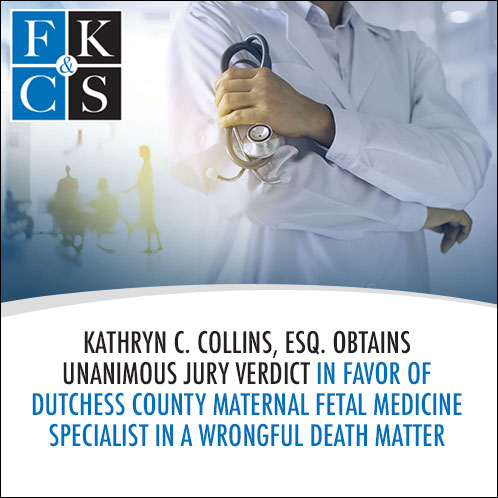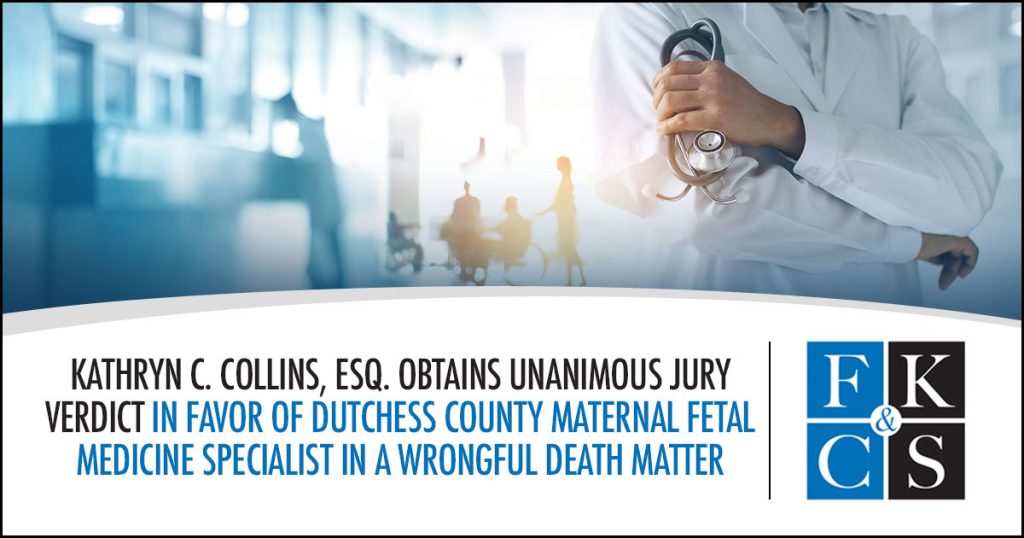 Kathryn C. Collins, Esq. obtained a unanimous jury verdict in Putnam County Supreme Court against self-proclaimed Mastermind and legal expert, John H. Fisher, Esq. in favor of a Dutchess County, NY maternal fetal medicine specialist in a case involving a maternal and fetal death during labor. The plaintiff, a resident of Putnam County, claimed that Feldman, Kleidman, Coffey and Sappe LLP’s (FKC&S) client failed to warn his wife about the risks associated with her plan to attempt a vaginal birth after cesarean section (VBAC) at home and that such failure led to his wife attempting the delivery at home with her midwife. During the labor, plaintiff’s wife suddenly became unresponsive and remained unconscious until she and the infant were pronounced dead at Putnam Hospital due to a posterior uterine rupture leaving behind the plaintiff and their twin toddlers who were almost 3 years old. FKC&S’s client had a limited involvement in the pregnancy and only saw the plaintiff’s wife on four occasions at the request of the treating midwife for the performance of ultrasounds to assess the fetus.
Kathryn C. Collins, Esq. obtained a unanimous jury verdict in Putnam County Supreme Court against self-proclaimed Mastermind and legal expert, John H. Fisher, Esq. in favor of a Dutchess County, NY maternal fetal medicine specialist in a case involving a maternal and fetal death during labor. The plaintiff, a resident of Putnam County, claimed that Feldman, Kleidman, Coffey and Sappe LLP’s (FKC&S) client failed to warn his wife about the risks associated with her plan to attempt a vaginal birth after cesarean section (VBAC) at home and that such failure led to his wife attempting the delivery at home with her midwife. During the labor, plaintiff’s wife suddenly became unresponsive and remained unconscious until she and the infant were pronounced dead at Putnam Hospital due to a posterior uterine rupture leaving behind the plaintiff and their twin toddlers who were almost 3 years old. FKC&S’s client had a limited involvement in the pregnancy and only saw the plaintiff’s wife on four occasions at the request of the treating midwife for the performance of ultrasounds to assess the fetus.
The plaintiff claimed that FKC&S’s client had the duty to advise his wife of the risks of homebirth, which included the risk of delayed care if an emergency arose, given they were not in a hospital setting which could lead to a worse outcome for both the mother and the baby, including death. Additionally, the plaintiff claimed that FKC&S’s client had the duty to advise his wife that there is a risk of uterine rupture in attempting a VBAC and that if that occurred while birthing at home instead of in a hospital where an operating room and surgical staff would be readily available, there was a risk of a worse outcome including death.
FKC&S’s client, a consultant in this pregnancy, performed four ultrasound studies, all of which revealed a healthy fetus. The reports were promptly sent to the plaintiff’s referring midwife. On the last visit to FKC&S’s client, on ultrasound it was determined that the baby was measuring large at an estimated 10 pounds, 9 ounces, but because the plaintiff’s wife had advised that she did not want to know the weight, it was written down on a piece of paper for the plaintiff and it was communicated to the midwife both via the report authored by FKC&S’s client, as well as by phone call. At no time during the care of the plaintiff’s wife was it requested that FKC&S’s client opine on the safety of the birth plan or the mode of delivery by either the midwife or the patient.
Also of note was the fact that the plaintiff’s wife was a certified doula and was 18 months into her studies to become a birth educator. Her course work included reading numerous books which discussed VBAC and the manner in which hospital-based physicians pushed patients to undergo C-sections needlessly. In fact, the plaintiff’s wife had authored numerous essays on these very subjects. Furthermore, the midwife’s records contained detailed consent forms which outlined clearly the risks associated with home births as well as the risks associated with VBACs at home, all of which were not only executed by the plaintiff’s wife but had been altered by her as well given the extensive research she had done on the topic. Lastly, at her last visit with her midwife prior to the onset of labor, the plaintiff’s wife was advised by her midwife that the safest manner to deliver, given FKC&S’s client’s estimated fetal weight measurement, was in a hospital setting via C-section. However, the midwife, who testified on behalf of FKC&S’s client, stated that the plaintiff’s wife refused as she was adamant that she did not want a C-section and she did not believe that she would be offered a fair trial of labor in a hospital setting. The midwife testified that she spoke at length to the plaintiff’s wife regarding the risks associated with her decision to continue to try to VBAC at home and that the plaintiff’s wife accepted those risks.
The plaintiff’s attorney requested over $10,800,000 in damages to compensate the plaintiff for his loss of household services and to compensate his two minor children their loss of maternal guidance. The jury unanimously found that FKC&S’s client properly evaluated and treated the plaintiff’s wife and that there was no duty to discuss the risks of the birth plan with the plaintiff’s wife.
Notably, the action was initially dismissed by the trial judge on motion by FKC&S when the judge found that FKC&S’s client had limited responsibility towards the defendant based on his limited role as a consultant who was not involved in the birthing plan. However, the action was then reinstated by an Appellate Court, which held that there were issues of fact as to the client’s involvement that required resolution by a jury. FKC&S was undaunted by this setback and maintained a strenuous defense on behalf of its client, holding true to its commitment to fight legal injustice to the healthcare community wherever it exists.

